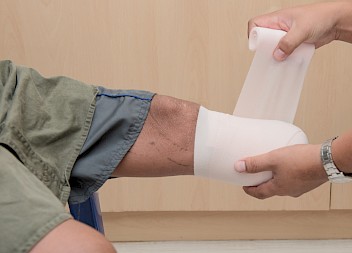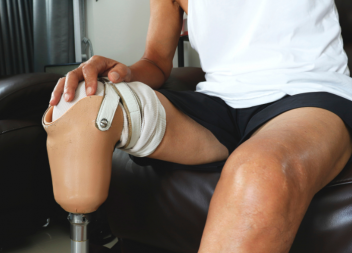£1,115,000 amputation claim achieved in an out of court settlement for the Claimant DB, aged 44. His compensation was made up of £115,000 for the amputation of his right leg, and all past and future anticipated financial losses.
Details of Claimant DB's amputation negligence case
In May 2014, DB had been experiencing pain in his right foot and lower leg for two days, so attended the emergency department of the Defendant Hospital. He also had difficulty bearing weight on his leg. No swelling was noted when he was examined and the examination did not cause pain. An ultrasound Doppler scan excluded the presence of a blood clot (DVT) in the right leg, so DB was discharged home.
Six days later, DB saw his GP as the pain had worsened. The doctor thought he was suffering from Achilles tendonitis.
Two further days later, he was taken back to the emergency department by ambulance. The ambulance paramedic noted he had been in pain for two weeks, getting worse despite pain relief and described the foot as cold and pale that day. At the hospital, a triage nurse recorded that the foot was cold to the touch and pale. No pedal pulse could be felt. DB stated that the foot felt tingly and cold, the calf felt tender and bruised and there was a mild loss of sensation in the toes. A locum specialist registrar diagnosed tendonitis and discharged DB.
DB's pain continued to increase. After another five days, he went to a different hospital, where immediate review was undertaken by the vascular team. An urgent procedure was done, called ‘iliac, femoral and popliteal embolectomies’ to try to improve blood flow in the right lower limb. By the end of the surgery a pulse could be felt in the posterior tibialis but a Doppler scan showed that there was obstruction in blood flow into the lower leg with poor prospects of saving the leg. Sadly, DB was advised that he would do better with a below-knee amputation.
DB’s claim alleged that the Hospital had been negligent in failing to provide an appropriate standard of care at the first two attendances in May. But for the negligence, acute limb ischaemia would have been diagnosed and prompt vascular surgical intervention would have restored circulation to the right leg. DB would have made a full and uneventful recovery and been fully independent within four months of treatment.
The Hospital denied negligence at the first hospital visit but admitted care was negligent for the second visit. However, it stated that the outcome would not have been any different, even had care been reasonable at the second visit. It was argued that DB would have lost his leg anyway.
DB’s recovery after amputation was not straightforward. The amputation stump failed to heal and became infected. DB had to have larval therapy and a long period of antibiotic treatment to fight the infection. However, this did not prevent necrosis (death of) muscle tissue. DB was then advised the amputation would have to be repeated but at above knee level.
After healing, he was able to use a prosthesis supplied by statutory services but it was an uncomfortable fit. His walking tolerance was very limited and he was reliant on a crutch when walking short distances and on a wheelchair when walking over 100 metres. He also sometimes required a stick when walking indoors. He suffered moderate to severe phantom limb pain. He felt the whole amputated limb as present, a sharp needle pain in the foot and, at times, a tingly sensation around the amputation scar. He also experienced pain in the right sacroiliac joint which was aggravated by standing and bending. Not surprisingly, DB developed an adjustment disorder with depressed mood.
DB’s hobbies and activities were significantly affected. He was unable to continue going to a gym, cycling, fishing and golfing. He was also unable to socialise. He lost his independence and required help with daily activities.
Our comment: had DB proceeded to a Trial then he may well have recovered a higher level of compensation. The settlement reflected a reduction in figures (of about one-third) during settlement negotiations to take account of the risks of going to a Trial.
Do you need support with an amputation negligence claim?
At Medical Solicitors, we offer free, no-obligation advice to anyone who believes they have an amputation negligence case. Contact us today to speak with our team of medical negligence experts.






